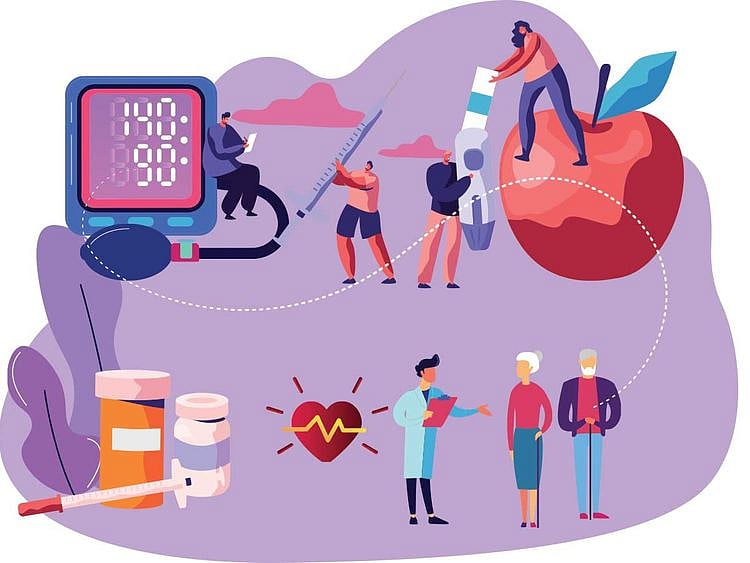Whether it’s type 1 or 2, diabetes mellitus shares a number of risk factors with high blood pressure (BP), or hypertension, such as obesity, inactivity, older age and hormonal imbalance.
Dr Igbal Mubarak Sirag, Internal Medicine Specialist at Bareen International Hospital — MBZ City in Abu Dhabi, says hypertension is common in both types of diabetes, but exactly when the condition manifests itself differs. “The latest research suggests that diabetes can lead to high BP by reducing the stretchability of blood vessels, in addition to the defect in handling the insulin.”
Dr Mohammad Sohil Al Hossni, Endocrinology Specialist at Medcare Hospital Sharjah, explains further: “Hypertension (where blood pressure is greater than or equal to 140/90 mm Hg) is a common comorbidity of diabetes, affecting 20-60 per cent of diabetics. It is also a major risk factor for cardiovascular and microvascular complications such as retinopathy and nephropathy.”
So with both diabetes and high BP, it’s important to provide treatment at the earliest to avoid potential complications and organ damage to eyes, heart, kidneys, brain and other organs, says Dr Sachin Upadhyaya, Cardiology Specialist at Aster Hospital, Mankhool. “One cannot get priority over the other, implying that it is important that both should be treated early.” Since hypertension is a comorbidity, it would be a good idea for diabetics — even those who are not diagnosed with hypertension — to monitor their blood pressure regularly. Various blood pressure monitoring devices to use at home are available in the market.
“Diabetes can lead to hardening of the arteries, which can make it difficult to get an accurate reading of someone’s upper arm when you’re taking their blood pressure,” says Shilpa Rosario, General Manager of Omron Healthcare Middle East.
The Omron Evolv has no wires or pumps, reads blood pressure (BP) from the upper arm and syncs wirelessly over Bluetooth with the user’s smartphone to present detailed analytics on their BP over time. “According to the International Society of Hypertension, high blood pressure is the number one contributing factor for global deaths and ten million people die unnecessarily every year due to untreated or undiagnosed raised BP,” says Rosario. “The situation becomes more acute with diabetes.”
Citing the International Diabetic Federation, Dr Sirag says the UAE ranks 11th globally and fifth regionally in the incidence of diabetes. “Almost a fifth of the UAE population has it. The highest population of diabetics falls into the 40- to 44-year-old range, compared with the global average of 55-59.”
Meanwhile, separate studies in Dubai, Al Ain and Abu Dhabi have suggested that 30 per cent of UAE residents suffer from hypertension.
Sign up for the Daily Briefing
Get the latest news and updates straight to your inbox
Network Links
GN StoreDownload our app
© Al Nisr Publishing LLC 2026. All rights reserved.
